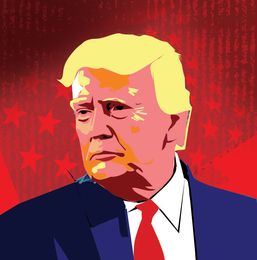Fearsome gods and kings are appeased, not opposed. Through history, this ingrained placatory habit is ordained by all religions and cultures. Vengeful gods are appeased with human and animal sacrifices, rituals, offerings of land, fruits, incense and jewels. In Judaism, God commands Abraham to kill his son to prove his loyalty, Aztecs sacrificed children, Ahaz, King of Judah, appeases the powerful Assyrian potentate Tiglath-Pileser III with golden gifts.
And so it is today. To oppose or to appease President Donald Trump? That is not even the question. To oppose is not an option, not until an internal rebellion erupts or much of the world unites against Trump’s arbitrary diktats. For now, world leaders parade to the White House to appease the omnipotent, bearing gifts of self-imposed tariffs and flattery. Like the wrathful gods of yore, Trump glowers, accepting the obeisance, unsmiling, unsatisfied, unpredictable.
Afraid of offending Trump, Italian Prime Minister Giorgia Meloni opts out of the annual G7 meeting that supports Ukrainian President Volodymyr Zelenskyy and excoriates Russian President Vladimir Putin. Swallowing Trump’s slurs and at gunpoint, Zelenskyy capitulates to the sacrificial demand of a minerals deal with the US. Spouting false statistics that are contradicted by his own government data, Trump threatens to add sanctions to tariffs on Canada.
“Why such lies?” asks Professor Ilan Kapoor of Canada’s York University. He answers that Trump’s populism feeds on voter anxiety over high food prices, housing crises and shrinking jobs. Manufacturing enemies to hate—unfair trading partners, migrants, trans people—unites disgruntled voters and channels their frustration into feel-good “Make America Great Again” and “American First” inspired xenophobia. “Blatant falsehood and bullying” are the weapons of his war, says Kapoor. Europe is shell-shocked by Trump’s bullying of Zelenskyy and pivot to Russia. European media editorialises that under Trump, “America is an unabashed predator”. Such descriptions of Europe’s most important ally was unthinkable two months ago.
The word “appeasement” scares Europeans. Google “appeasement” and you are flooded with references to former British Prime Minister Neville Chamberlain. The internet labels him the “father of appeasement”. In the 1930s, Britain appeased Nazi Germany to avoid another catastrophic world war. Though respected for his earlier social reforms, Chamberlain was vilified for appeasing Hitler, a policy that backfired, wrecked Europe and destroyed his reputation. The horror of appeasement was a lesson learnt well nearly a hundred years ago.
But authoritarianism and appeasement are time immemorial global phenomena. The Oscar-nominated film I’m Still Here is the true story of a family torn apart by the terror unleashed by Brazil’s military dictatorship in 1971. While movie-goers rave about the film, its ban is demanded by supporters of former Brazilian President Jair Bolsanaro dubbed, “Trump of the Tropics”, who lost the 2022 presidential elections. Ironically, the film’s Oscar celebrations coincided with a poll of Generation Z in the UK. Disturbingly, it revealed over half of Britons, aged between 13 and 27, felt their country should be a dictatorship with many believing the army should be in charge. Buffeted by uncertainties and anxieties, the youth yearn for order, experts explain.
Across centuries and around the world, so many people sacrificed their lives for democracy and freedom. There is no freedom in appeasement, it is the fawning face of fascism. Attempts to appease Trump is taken as proof that his threats work. It also means more demands will come. King Ahaz’s appeasement backfired. He became a vassal, his kingdom destroyed by his false foreign ally. But in this age, memories are shorter, legends and history more easily forgotten.
Pratap is an author and journalist.


